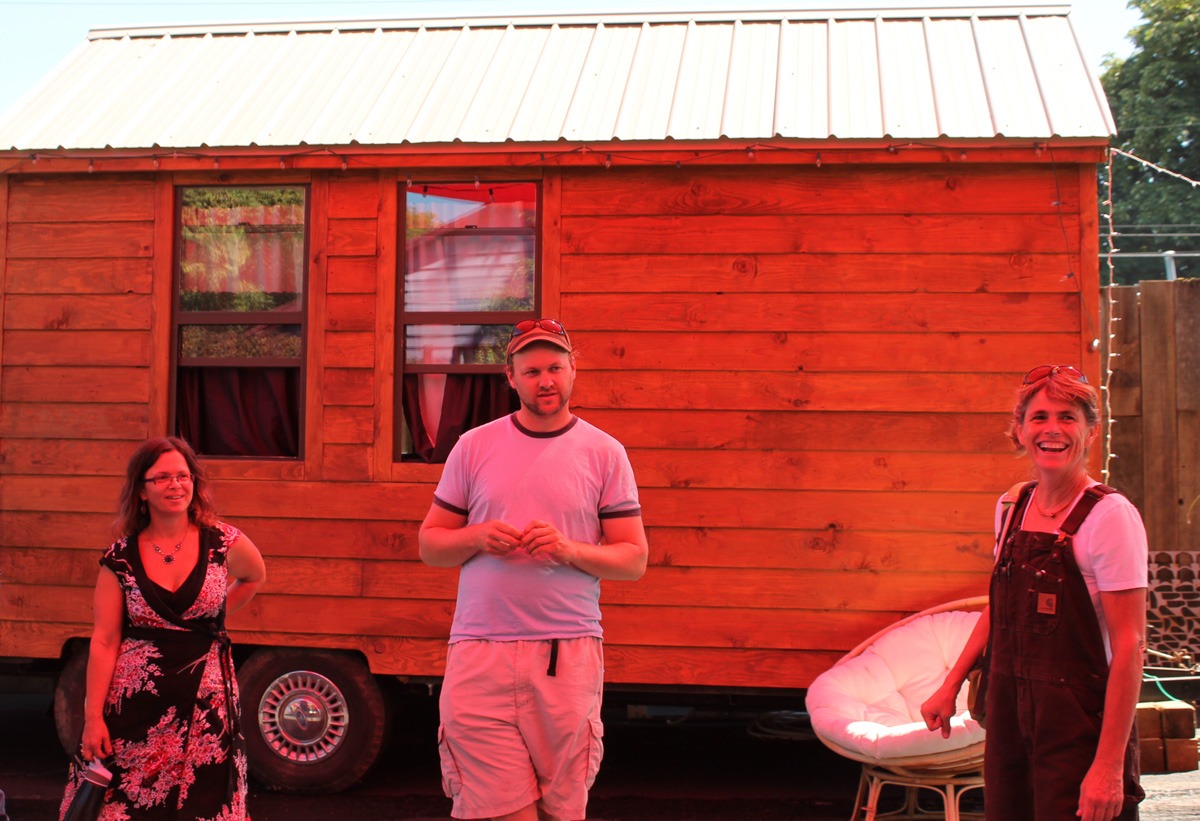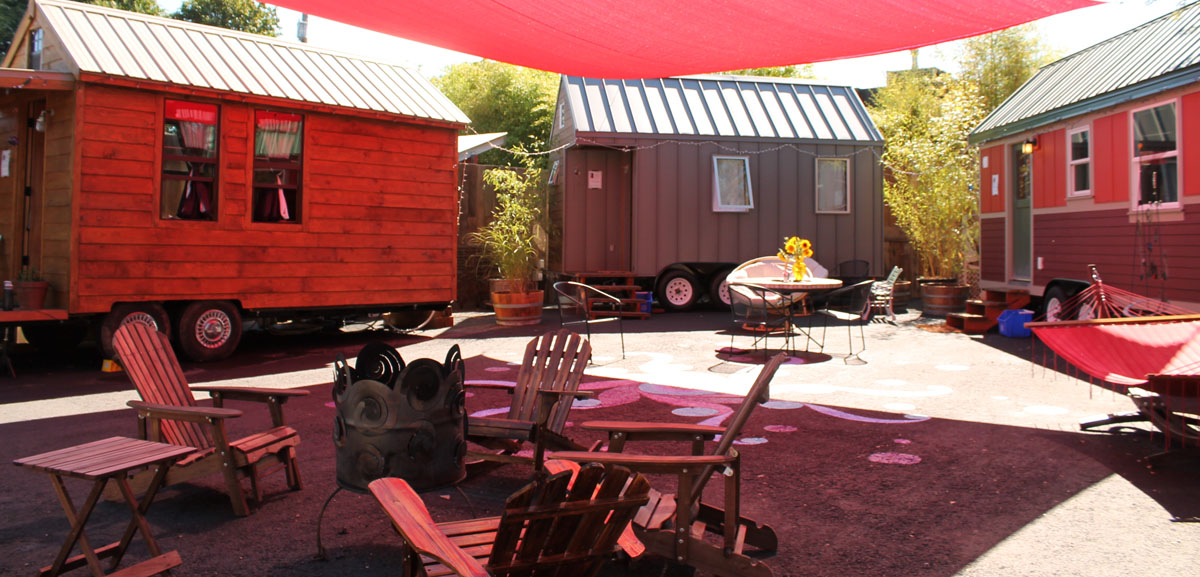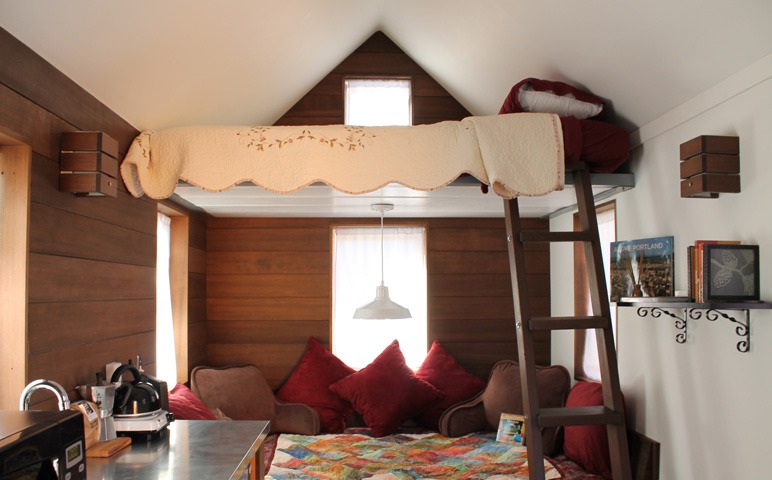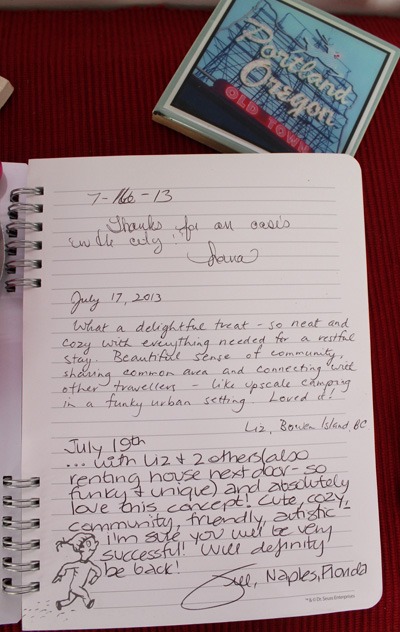
Portland Alternative Dwellings is happy to operate out of Portland for many reasons, including that it’s a place where people aren’t afraid to blaze a new trail. So we’re not surprised that Portland now hosts Caravan, America’s first tiny house hotel. Caravan includes three separate tiny houses rentable by the night, and space for two more. We at PAD are excited about the launch because Caravan is a rare opportunity for people who are curious about tiny houses to test drive what it’s like to spend time in them, and get a real sense of whether it feels like the housing choice for you.
PAD workshop instructor Lina Menard blogged last week her experiences at Caravan, and now that it’s officially open, we want to give you some more inside scoop. PAD pal and collaborator Billy Ulmer recently sat down with Kol Peterson and Deb Delman, the founders of the Caravan, as the group from a PAD Tiny House Basics Workshop toured the space and the houses. This post will cover their hopes for what Caravan becomes, how people have reacted to this new tiny house “first”, and what they’re looking for to fill those last two tiny house hotel parking spots.

Billy: Where did the idea for Caravan come from?
Deb: Both of us, for years, have been attracted to, and lived in, small houses and funky, alternative dwellings. We’re big fans of tiny houses, and we had an incredible opportunity in this very visible location to showcase small housing and make a tiny house hotel.
Billy: How has the tiny house community responded? Who has been booking it?
Deb: Quite a number of the people who’ve contacted us for reservations already know about tiny houses or want to build them. It’s been such a range – all different ages, families, single people. With the foot traffic we get from people just walking by, some people are like, “What is this?”, and some are like, “I love tiny houses, this is great!” It’s not a bunch of young people who are in their 20s and 30s and very alternative. The interest has been from all walks of life.
Billy: How have your neighbors reacted?
Kol: There are literally four bars within 50 feet of us, so we’re complementary to the businesses of our commercial neighbors. We’re now in conversation with one of the restaurants to provide room service for our guests.
Deb: Which they initiated, which is so crazy.
Kol: We were also approached by a local masseuse who’s two blocks away and wants to provide massages to guests who want massages.
Billy: That’s funny, because part of the idea of tiny house living in general is that you rely on your neighbors more, and that you’re not totally self-sufficient, but that there are things that work well about that. So in the commercial version you’ve put together, you don’t have to provide the masseuse, because there’s already an existing masseuse right next door.
Kol: Exactly. Our tiny houses have minimal kitchens, unlike some tiny houses, but that’s because we have so many awesome restaurants and bars as our neighbors.
Deb: Who needs to cook when we have great food all around us?
Billy: What do you hope Caravan becomes?
Kol: Practically speaking, we want to host two more tiny houses. We are interested in finding other finished tiny houses available for lease, or lease to own.

Billy: Did you influence the builders of these houses?
Kol: We have some minimum requirements that we need. They absolutely must have a residential flush toilet, hot shower, electric resistance heat, a queen bed, and they have to be 22 feet long or less. But beyond that, we’re looking for diversity. Deb and I have a particular aesthetic that’s more along the line of the gypsy wagon or Vardo wagon, and I think eventually we’d like to have a portfolio that’s primarily in that style. But those are even more rare than tiny houses, which are already rare.
We don’t aspire necessarily to own the tiny houses. We want to work with builders who want to build a house but don’t necessarily want to use it, and are open to leasing it out. We’d have five houses here right now if we could, we just only found three. One of these was built by Derin Williams (of Shelter Wise), and two were owned by Eli Spevak (of Orange Splot). We knew them both.
It was surprising to me how hard it is to find finished tiny houses for rent. A lot of people have unfinished tiny houses and they need a place to put them while they finish them, or they have a house and they need a place to live in it, and that doesn’t make financial sense for us to provide. Another thing we’re interested in is working with the tiny house community to serve as an educational space, as a space where builders can learn about tiny houses and show off their tiny houses. But our top priority right now is to dial in the experience for the guests.
Deb: We are madly in love with Portland. We’re showcasing local art, and everything here was made by local people. We not only want to showcase the culture and possibilities of Portland and what’s happening outside of this lot, we also want people to have this urban camping experience, right in the middle of Portland. For us creating the lot as a gathering space is just as important as getting the tiny houses themselves.
Kol: We’re eager to host events, weddings, family reunions, niche conferences, PAD workshops… We’re open to creative ways to use the unique space. We’re not even launched yet and we’re full for the next five days, so that’s a good start!
* * * * *
Click here for part two of the interview, where we share Kol and Deb’s experience getting city approval for the hotel, their advice for other potential tiny house hoteliers, and we’ll geek out on how tiny houses can support the sharing economy and contribute to good urban planning.


Comments are closed.